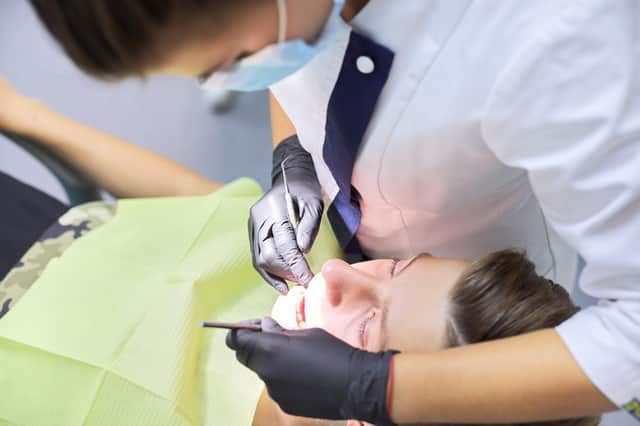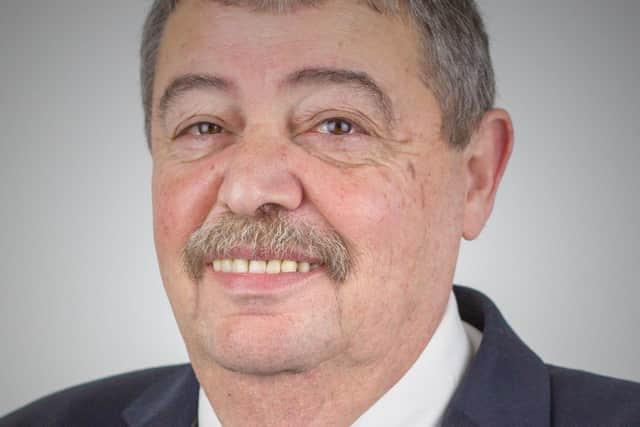Early detection of mouth cancer an 'unacceptable lottery' amid dentistry cuts, critics claim


With the number of cases growing by 58 per cent in the last decade, early diagnosis at check-ups is seen as the key to life-saving treatment.
However, critics say many people were struggling to access NHS dentistry even before the coronavirus crisis forced surgeries to close and then reopen with severely reduced capacity, meaning too often the cancer is often being discovered at a late stage.
Advertisement
Hide AdAdvertisement
Hide Ad

NHS Digital figures show hospital admissions for oral cancer increased by 30 per cent in England between 2010/11 and 2019/20, to 26,773.
Patients will be captured more than once if they have to be admitted for treatment multiple times.
Figures from the Oral Health Foundation meanwhile show there were 8,722 diagnoses of mouth cancer in the UK in 2019 – an increase of 58 per cent compared to 10 years ago and up 97 per cent over the last 20 years.
Tragically, 2,701 people died from the illness in 2018. The British Dental Association (BDA) warns many people may now be ‘walking around with oral cancer that hasn’t been picked up’ thanks to the pandemic.
Advertisement
Hide AdAdvertisement
Hide AdIt comes as statistics in Portsmouth revealed fewer people were being treated and diagnosed with oral cancer, sparking fears early warning signs – often picked up during dental treatment – were being missed.
Chairman of the BDA, Eddie Crouch, said: ‘Dentists are on the frontline for picking up on the telltale signs of oral cancer. The condition claims more lives each year than car accidents, and early detection really is key.”
But he said that ‘millions of patients are now struggling to get an appointment’, adding: ‘For years check-ups have been effectively rationed which made the early detection of these life changing cancers an unacceptable lottery.’
Since between 2014/15 and 2019, the number of people diagnosed with oral cancer by Portsmouth Hospital NHS Trust has plummeted 25 per cent, from 345 to 260.
Advertisement
Hide AdAdvertisement
Hide AdHealth chiefs fear even more people in the city – too scared to seek treatment or help due to concerns over the coronavirus – could be missing out on life-saving treatment and intervention.
The news comes as the number of missed NHS dental appointments nationally had reached 15 million in the year to the end of August when compared to the same period in 2019, according to the organisation.
Even before the pandemic, an estimated four million people in England were not accessing NHS dentistry because they could not find a practice, could not afford the charges, were on a waiting list or had not even tried to find a dentist because they assumed they would fail, the BDA said.
Now with practices operating at a fraction of their former capacity, numbers have surged.
Advertisement
Hide AdAdvertisement
Hide AdDr Phillip Lewis, of the Mouth Cancer Foundation, said patients should see a dentist at least once a year, but in practice millions of people do not meet even this most basic recommendation.He said: ‘The chances of treating mouth cancer are the greatest when it is found early - but it is often discovered late because patients have not been coming in for regular examinations.
‘When mouth cancer is discovered in its earliest stages the chances of complete cure over five years are really good – about 95 per cent.
‘But as soon as there is a time delay and the cancer spreads, the survival rates absolutely plummet and the treatments are really unpleasant.’
Dr Lewis said an ‘underfunded’ system, an inadequate target-driven contract and problems with recruitment were all factors in limiting access to NHS dentistry.
Advertisement
Hide AdAdvertisement
Hide AdA spokesperson for the Department of Health and Social Care, which is responsible for dentistry in England, said: ‘Every cancer patient deserves the best possible care and we are committed to detecting more cancers at an earlier stage to save an estimated 55,000 lives a year by 2028.
‘As part of this, every dentist is expected to fully assess their patient’s oral health to look for the signs of cancer.’
Comment Guidelines
National World encourages reader discussion on our stories. User feedback, insights and back-and-forth exchanges add a rich layer of context to reporting. Please review our Community Guidelines before commenting.